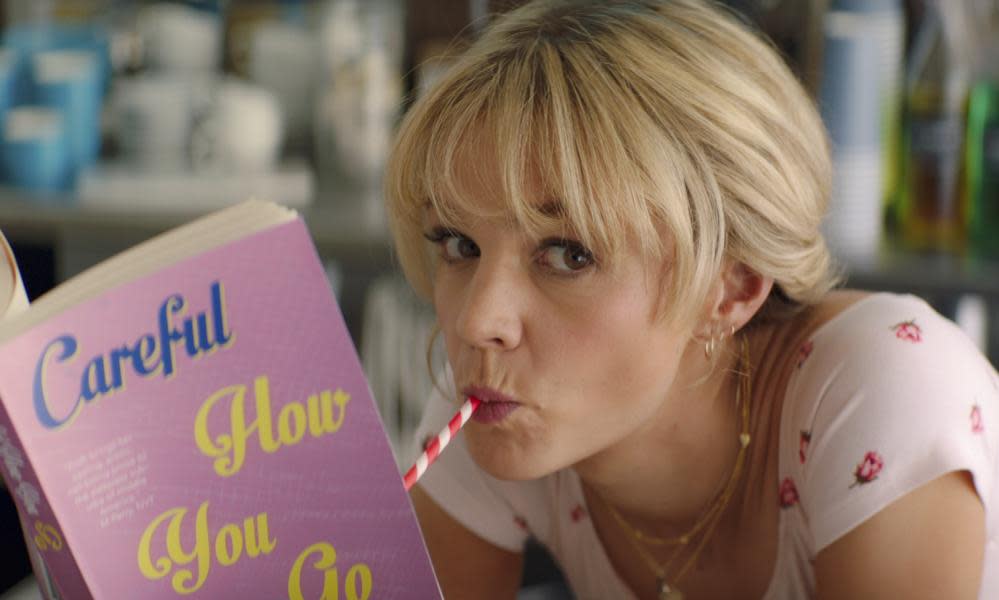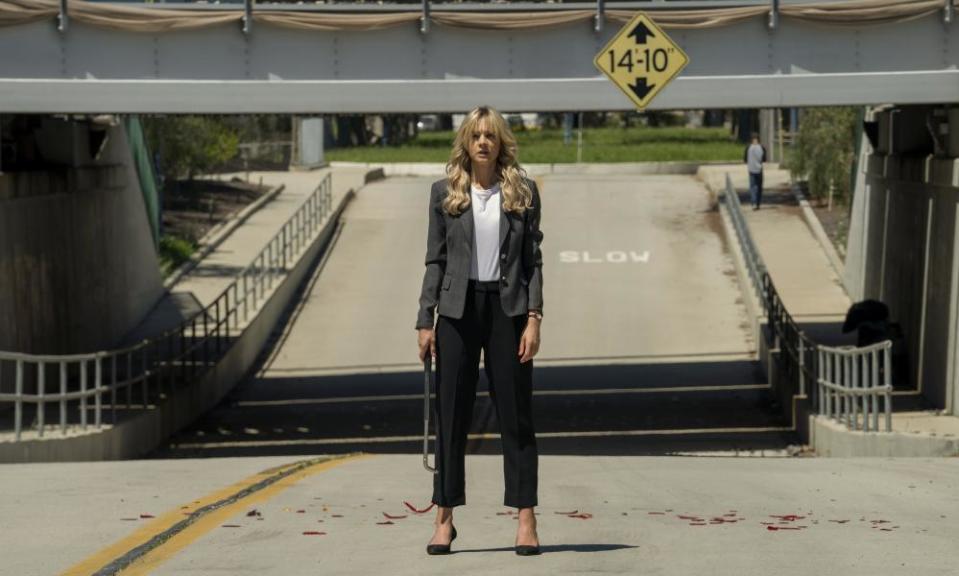How Promising Young Woman shows the limits of #MeToo revenge
- Oops!Something went wrong.Please try again later.

Promising Young Woman, writer/director Emerald Fennell’s acidic dark comedy which coats an incendiary rape revenge plot with a pastel sheen, runs an alluring, looping trap: Cassie, a singularly obsessed character played with singularly impressive depth by Carey Mulligan, pretends to be near-passed-out drunk at a bar, plays along to a skeevy man’s predatory machinations, then flips the switch when he begins to sexually assault a woman he believes is too drunk to notice or care. “What are you doing?” she asks, suddenly stone-cold sober. The first time Cassie pulls the trap, in the film’s first sequence, it’s not quite shocking – if you’ve seen the trailer, you know her revenge scheme – but given that it’s The OC heartthrob Adam Brody as the aw-shucks predator, Mulligan’s archly calibrated facade drop is an enticing and unnerving jolt.
Related: Promising Young Woman review – Carey Mulligan ignites fiery #MeToo revenge tale
I wanted to root for this trap – the film wants you to cheer for this hook – but by the second ruse, as Cassie shocks and condemns another louche loser (this time played by Superbad’s Christopher Mintz-Plasse), the thrill of exposure wanes. By midway, when Cassie, on a one-last-revenge grief bender for her unseen best friend (I won’t spoil the very bad thing that underpins her rage, but it’s not hard to guess from the film’s beginning), targets her past medical school dean (Connie Britton) who turned a blind eye to devastating behavior, I had to hit the pause button. The film has been billed as a thrilling revision of the tired rape revenge drama, a #MeToo romp that relishes comeuppance for self-justifying bad men. But Cassie’s annihilating obsession – the reduction of her character to the long shadow of the worst thing that’s ever happened to her – felt not giddy or revelatory but frustratingly dead-ending. The film didn’t feel edgy or provocative so much as, in its singular focus on vigilante justice, a very recent relic of the early, heady days of public #MeToo rage.
Promising Young Woman, with its tart bite and dark fatalism, is deliberately disquieting, but watching it in late 2020 felt unsettling, like a song just out of tune. Its molten core threw me back to late 2017, when the early #MeToo movement flooded with white-hot rage – a constellation of private pains suddenly given vague, if still revelatory, shape in the public forum. There were many deep-rooted hooks to hang outrage on to: the Harvey Weinsteins, which ignited lingering outrage over the Brock Turner case, which was itself reminiscent of the 2012 Steubenville high school gang rape recorded on cellphone footage (a crime and trauma similar to the unseen tragedy at the heart of Promising Young Woman), which landed in a much different media landscape, along with the story of Daisy Coleman, than the one we occupy now.
But three-plus years removed from the fuse of the #MeToo movement, a decade-plus into the internet’s loose flotsam of story after story of horrific, excused, mundane, infuriating cases of sexual assault and our culture’s ill-preparedness to discuss it with any psychological nuance, we know there are bad men, bad excuses, bad records. Unmasking is a limited thrill. Promising Young Woman boils an archetypical assault story into its starkest shades – vigilante and bad, unchanged people, a woman whose trauma subsumes her personhood. Where is the insight in that exposure? What’s left when the rage boils off?
Part of Promising Young Woman’s nano-specific anachronism owes to the long pipeline of film development further stretched by the pandemic (after a hyped debut at Sundance, Focus Features pushed its wide release date from April to Christmas Day), and the hyper-velocity of late 2010s internet in which cultural conversations balloon and burst by the day and week. The film has its strengths – Mulligan’s performance, how it weaponizes the benefit of the doubt afforded to Cassie’s blonde, white femininity, with her feathery bangs, rainbow manicure and bubblegum pink wardrobe. (The fact that the film’s commercial premise – a revenge fantasy in which a woman systematically targets nice-seeming men – largely hinges on Cassie’s blonde, white femininity goes unmentioned, an undeniable limitation.)

But its problems – setting up easy punches against thinly drawn characters who say and do all the wrong things – glare when compared with other contemporaneous works tackling the shape-shifting ghouls of trauma, the slipperiness of complicity, and the insidiousness of prioritizing power over clarity, such as HBO’s The Tale, which explores time and trauma’s fracturing of self-narratives, and one woman’s capacity to change her understanding of what happened to her. Or the finale of HBO’s I May Destroy You, which uses rape fantasy as a mechanism for healing without trauma becoming obliterative, Cassie-style dark matter. Last year’s The Assistant eschews the bad men-focus of Promising Young Woman for a gripping (if tonally opposite) portrait of systemic rot and toxic adjacency at a Weinstein-esque production company.
In other words, all pieces which transmute the same soup of horror into jagged, irreducible edges, that burrow out of rather than into the bifurcation of good and bad people. Promising Young Woman’s macabre, candied denouement certainly shocks, but at the cost of surprise; there’s little room to run when both Cassie and the film assumes everyone’s worst potential. That bleakness holds to the early days of #MeToo, when exposure was revelation, when recognition of the scope of toxicity was the story. I’d like to understand the next chapter, to believe in healing, or change, or potential, or complication, or moving forward, which could also be the sweetest revenge.
Promising Young Woman is out in US cinemas and will be released digitally in January with a UK release on 12 February

